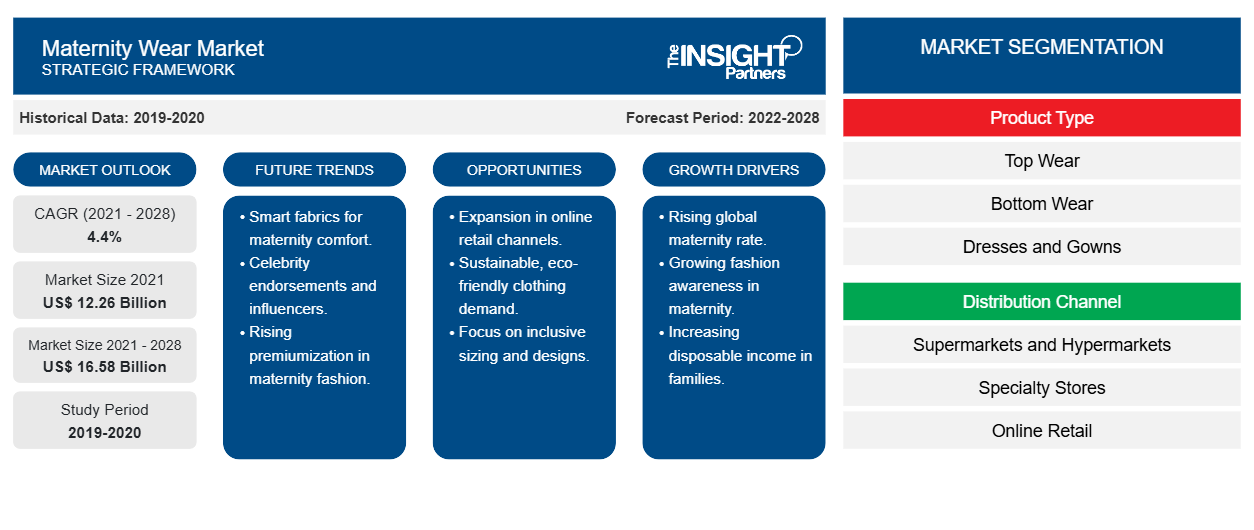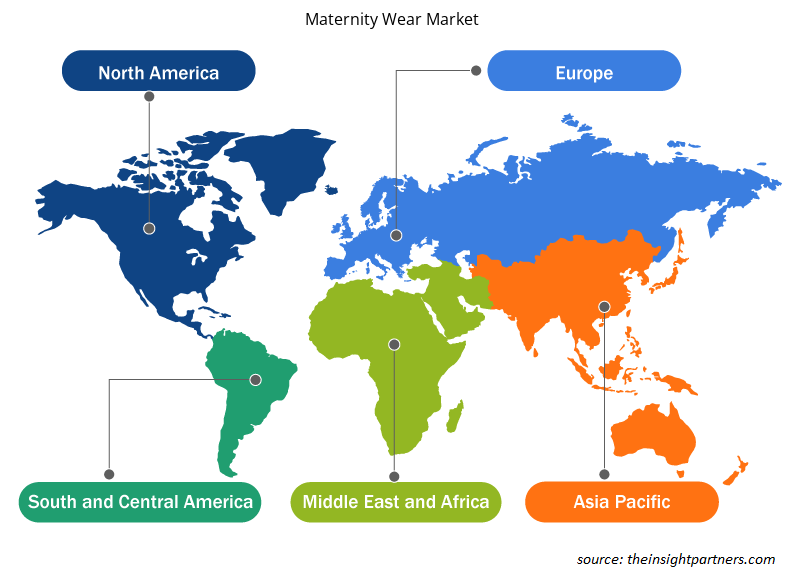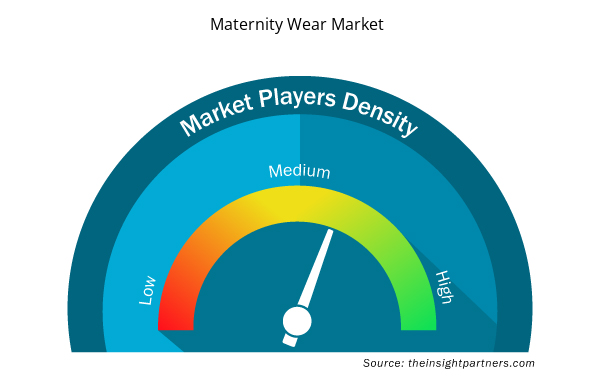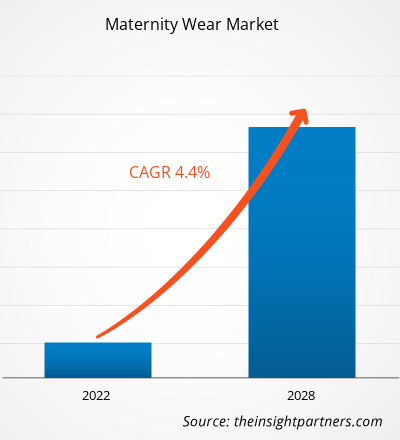The maternity wear market was valued at US$ 12,257.41 million in 2021 and is projected to reach US$ 16,578.64 million by 2028; it is expected to grow at a CAGR of 4.4% from 2021 to 2028.
Maternity wear is typically created with a loose, appropriate fit that contains elastic, tabs, and stretchable fabric, such as elastane and spandex, to provide extra comfort to the consumer during pregnancy.
Asia-Pacific held the largest share of the global maternity wear market in 2020, whereas North America is expected to register the highest CAGR during the forecast period. There is an average of 85% of pregnant working women in the US according to the World Bank report. Thus, the demand is increasing for maternity wear and plus sizes in formal wear under the formal dresses and gowns section. This is a major factor contributing to the maternity wear market growth in North America.
Impact of COVID-19 Pandemic on Maternity Wear Market
Impact of COVID-19 Pandemic on Maternity Wear Market
The COVID-19 pandemic has adversely affected many industries including the consumers good industry. The pandemic created operational difficulties due to lockdowns, business shutdown, and supply chain disruptions. Clothing and apparel retail stores recorded high losses in sales. Financial results published by fashion brands such as the Spanish Inditex Group and the Swedish H & M laid bare the enormity of the pandemic’s impact. Furthermore, e-commerce experienced a long-lasting benefit from the pandemic, as most online purchasers consider e-retail as a post-pandemic option. Additionally, rising rates of vaccination, revival of manufacturing activities, and relaxation of government regulations are projected to positively influence the global maternity wear market during the forecast period.
Customize This Report To Suit Your Requirement
You will get customization on any report - free of charge - including parts of this report, or country-level analysis, Excel Data pack, as well as avail great offers and discounts for start-ups & universities
Maternity Wear Market: Strategic Insights

- Get Top Key Market Trends of this report.This FREE sample will include data analysis, ranging from market trends to estimates and forecasts.
Customize This Report To Suit Your Requirement
You will get customization on any report - free of charge - including parts of this report, or country-level analysis, Excel Data pack, as well as avail great offers and discounts for start-ups & universities
Maternity Wear Market: Strategic Insights

- Get Top Key Market Trends of this report.This FREE sample will include data analysis, ranging from market trends to estimates and forecasts.
Market Insights
Adoption of Business Growth Strategies Drives Market Growth
Well established players in the market adopt various strategies to overcome current and future challenges for company’s expansion. For instance, Isabella Oliver adopted a market penetration strategy by launching a rental program of maternity wears to improve their reach. On January 20, 2020, the brand again launched a new rental program to become circular and increase the longevity of maternity clothing. Isabella Oliver offered its customers the new range of options to rent a dress, including party wear and fundamental pregnancy essentials, for two weeks, before returning free of charge. The brand even takes care of the dry cleaning. Customers can also buy the product. The idea of renting maternity wear is to encourage customers to go greener and eliminate the effects of fast fashion. So, the product innovations and penetrations led to an increase in the demand for maternity wear. These factors are driving the growth of the maternity apparel market.
Distribution Channel Insights
Based on distribution channel, the maternity wear market is segmented into supermarkets and hypermarkets, specialty stores, online retail, and others. The online retail segment is expected to register the highest CAGR during the forecast period. E-commerce played a vital role during the initial months of the COVID-19 pandemic, as physical retail stores were not permitted to operate. During lockdowns, people increasingly used e-commerce platforms to buy essential and nonessential products. The economic crisis due to the COVID-19 outbreak resulted in reduced disposable incomes of women. However, the demand for maternity wear was not affected. As a result, competitive pricing is likely to become a key feature of the complete landscape in the future. This factor is projected to potentially bolster the market growth for the online retail segment during the forecast period.
Product Type Insights
Based on product type, the maternity wear market is segmented into top wear, bottom wear, dresses and gowns, and innerwear. The top wear segment accounted for a larger market share in 2020, and the dresses and gowns segment is expected to register a higher CAGR during the forecast period. Maternity top-wear cloth consists of formal wear and casual wear. Moreover, the demand for formal maternity wear is rising due to the increasing number of working females. Formal maternity top-wear consists of kurtis, blouses, soft material tank dresses, blazers, and trench coats with double layers. Casual wear comprises tunics, maxi dresses, and oversize sweatshirts and t-shirts. Maternity clothes are made of the best quality fabrics with natural and comfortable materials, such as cotton, modal, and bamboo, as they are soft and allow steady breathing. Pregnant women tend to choose material according to seasonal changes. In summer, they prefer heat repelling linen cloths for easy airflow, whereas in winter, warm woolen coats are preferred to prevent cold.
A few players operating in the maternity wear market are Gap Inc, Seraphine, Isabella Oliver, H and M Hennes and Mauritz AB, Brunelli and Co S.R.L., Mothercare, Boob Design, SHAICO Fashion Pvt. Ltd, Pink Blush Maternity, and Organic & More.
Maternity Wear Market Regional Insights
Maternity Wear Market Regional Insights
The regional trends and factors influencing the Maternity Wear Market throughout the forecast period have been thoroughly explained by the analysts at Insight Partners. This section also discusses Maternity Wear Market segments and geography across North America, Europe, Asia Pacific, Middle East and Africa, and South and Central America.

- Get the Regional Specific Data for Maternity Wear Market
Maternity Wear Market Report Scope
| Report Attribute | Details |
|---|---|
| Market size in 2021 | US$ 12.26 Billion |
| Market Size by 2028 | US$ 16.58 Billion |
| Global CAGR (2021 - 2028) | 4.4% |
| Historical Data | 2019-2020 |
| Forecast period | 2022-2028 |
| Segments Covered |
By Product Type
|
| Regions and Countries Covered | North America
|
| Market leaders and key company profiles |
Maternity Wear Market Players Density: Understanding Its Impact on Business Dynamics
The Maternity Wear Market market is growing rapidly, driven by increasing end-user demand due to factors such as evolving consumer preferences, technological advancements, and greater awareness of the product's benefits. As demand rises, businesses are expanding their offerings, innovating to meet consumer needs, and capitalizing on emerging trends, which further fuels market growth.
Market players density refers to the distribution of firms or companies operating within a particular market or industry. It indicates how many competitors (market players) are present in a given market space relative to its size or total market value.
Major Companies operating in the Maternity Wear Market are:
- Gap Inc
- Seraphine
- Isabella Oliver
- H & M Hennes and Maurits
- Brunelli & Co. S.R.L
Disclaimer: The companies listed above are not ranked in any particular order.

- Get the Maternity Wear Market top key players overview
Report Spotlights
- Progressive industry trends in the maternity wear market to help players develop effective long-term strategies
- Business growth strategies adopted by developed and developing markets
- Quantitative analysis of the maternity wear market from 2019 to 2028
- Estimation of global demand for dairy ingredients
- Porter's five forces analysis to illustrate the efficacy of buyers and suppliers operating in the industry
- Recent developments to understand the competitive market scenario
- Market trends and outlook as well as factors driving and restraining the growth of the maternity wear market
- Assistance in decision-making process by highlighting market strategies that underpin commercial interest, leading to the market growth
- The size of the maternity wear market size at various nodes
- Detailed overview and segmentation of the market, as well as the maternity wear industry dynamics
- Size of the maternity wear market in various regions with promising growth opportunities
- Historical Analysis (2 Years), Base Year, Forecast (7 Years) with CAGR
- PEST and SWOT Analysis
- Market Size Value / Volume - Global, Regional, Country
- Industry and Competitive Landscape
- Excel Dataset



Report Coverage
Revenue forecast, Company Analysis, Industry landscape, Growth factors, and Trends

Segment Covered
Product Type, and Distribution Channel

Regional Scope
North America, Europe, Asia Pacific, Middle East & Africa, South & Central America

Country Scope
Argentina, Australia, Brazil, Canada, China, France, Germany, India, Italy, Japan, Mexico, Russian Federation, Saudi Arabia, South Africa, South Korea, United Arab Emirates, United Kingdom, United States
Frequently Asked Questions
The global maternity wear market is driven by the rising number of pregnant working women coupled with the adoption of business growth strategies by the market players.
Based on distribution channel, the supermarkets and hypermarkets segment held the largest market share in 2020. Supermarkets and hypermarkets, considered as an effective distribution channel, are large retail stores that offer a wide range of maternity clothes. Many leading manufacturers of maternity clothes target selling their products through prominent supermarkets and hypermarkets chains, such as Mom & Baby, Mother Care, and FirstCry, as there is high customer traffic in these stores. This factor is also driving the popularity of supermarkets and hypermarkets for purchasing maternity clothes.
Top wear accounted for a major share in 2020. Maternity top-wear cloth consists of formal wear and casual wear. The demand for formal maternity top wear is rising due to the increasing number of working females. Formal maternity top-wear consists of kurtis, blouses, soft material tank dresses, blazers, and trench coats with double layers, and casual wear comprises tunics, maxi dresses, and oversize sweatshirts and t-shirts.
The major players operating in the global maternity wear market are Gap Inc, Seraphine, Isabella Oliver, H & M Hennes and Maurits, Brunelli & Co. S.R.L., Mothercare, Boob Design, Pinkblush Maternity, Adidas America Inc., and Organic and More among others.
In 2020, Asia Pacific held the largest share in the global maternity wear market. Asia-Pacific continent comprises several developing and developed economies such as India, China, Japan, South Korea, and Australia. These emerging countries are witnessing an increase in spending by new mothers to be over their first pregnancy photo-shoots, accompanied by growing purchasing capacity of women in this region.
Trends and growth analysis reports related to Consumer Goods : READ MORE..
The List of Companies - Maternity Wear Market
- Gap Inc
- Seraphine
- Isabella Oliver
- H & M Hennes and Maurits
- Brunelli & Co. S.R.L
- Mothercare
- Boob Design
- Shaico Design Pvt. Ltd.
- Pinkblush Maternity
- Organic & More

 Get Free Sample For
Get Free Sample For